From the Language of “Bêtises” to One of “Belonging”
Monday, October, 27th, 2025 Academic Programs Community Newsletter
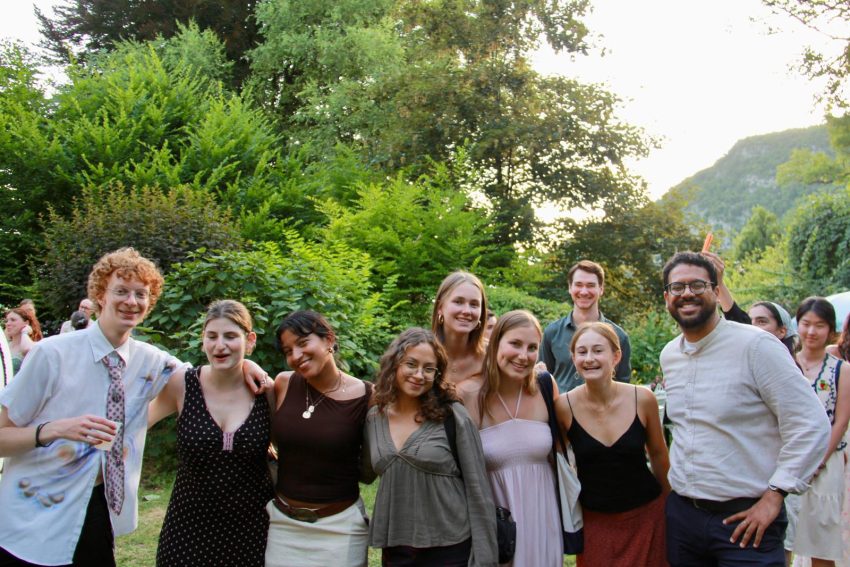
With the Tufts in Talloires 2025 students in France. An unforgettable summer. Photo by Meredith Doherty.
At the Tufts University European Center, we often speak about how study abroad experiences transform the way students see the world. For me, that immense transformation began long before I joined the Center. It started with a surprising love of French language and culture, and an eventful journey, that eventually led me the the magical, village under the moon (in Celtic, Talloires comes from Tall’eur, meaning “facing the moon,” a fitting symbol - I would say - for learning to face what is unfamiliar and finding light in it).
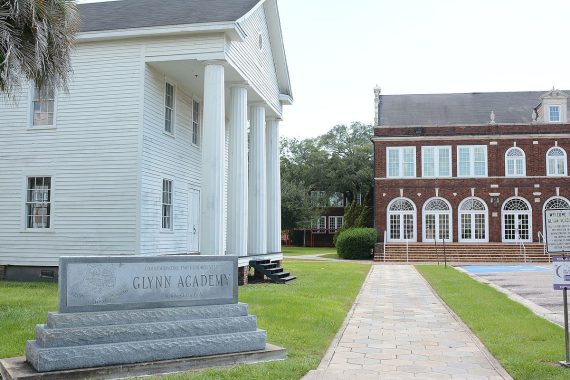
Glynn Academy in Brunswick, Georgia, where my love of French began in Madame Ansley’s class. This is where the door to another world first opened.
Alors! My love of French began in Brunswick, Georgia, where my older sister was taking French lessons from Madame Ansley at Glynn Academy. Madame Ansley was a small woman, short in stature with white, glassy hair, thick round glasses, and a bright, piercing, unmistakable French accent that filled the room with life. There was something entirely magnetic about her presence. She carried with her everywhere she went the warmth and curiosity of another world, one that felt far removed from the quiet routines and choreographed lulls of our coastal town. Through her, French became more than a tool of communication for me; it became a promise that life could be so much broader, so much richer, and excitingly full of discovery. For me, she was the first person within the walls of the Academy who made the strange new world feel wide and inviting.
My sister began taking her course, and I, of course, needing to do everything my older sister did, quickly followed suit. French soon became the language my sister and I used for secret and mischievous deeds - la langue des bêtises - because our parents could not understand a word of it. Or so we thought. We filled afternoons with laughter, arguments, and our own deep analytical and philosophical debates: “Toi, tu es faim?” one of us would ask; “Oui, je suis faim!" the other would answer (we were learning, ok?). "Donc! On va manger des chicken nuggets!” we both would agree. And we laughed and laughed, again and again, over inside jokes that made little sense to anyone else in the room. “Où est la bibliothèque?” “Oui, comme ci, comme ça." Yet another bout of laughter. What began as those small moments between us became the foundation of something much deeper for me: a lifelong connection to a culture and whole new way of seeing the world.
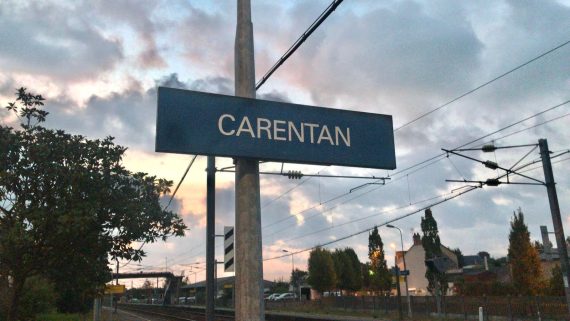
Where my French journey deepened: the train station in Carentan, Normandy, where I lived and taught English through the TAPIF program in 2018-19.
Years later, in 2018, I found myself in Carentan-les-Marais, a small port town in sleepy Normandy, teaching English and Spanish through the Teaching Assistant Program in France (TAPIF) program. Living there was eye-opening, and stepping into France for the first time felt like walking into the pages of a story I had long imagined in Madame Ansley’s classroom. The words I had learned years earlier had suddenly found color, sound, and air. Carentan was a quiet, close-knit community surrounded by green fields and cobblestone streets, a place where people noticed and cared for one another. My students brought curiosity, humor, and pride to every lesson, and their eagerness to share their own stories made each day feel meaningful. I had always seen language as an academic pursuit, but in Normandy it became a way of belonging. Every café conversation, every walk through the market, every exchange with my students reminded me that language is not only a means of communication: it is a doorway to empathy and understanding.
After returning to the United States, I began interning with the Alliance Française d’Atlanta, where I helped others find their own pathways into French language and culture. That experience deepened my belief that language learning is one of the most powerful tools we have for building bridges across difference. It is, in many ways, a form of diplomacy and an act of curiosity, openness, and respect. I began to understand that the real impact of education lies not only in what students learn, but in how those lessons shape their view of the world and their sense of responsibility within it.
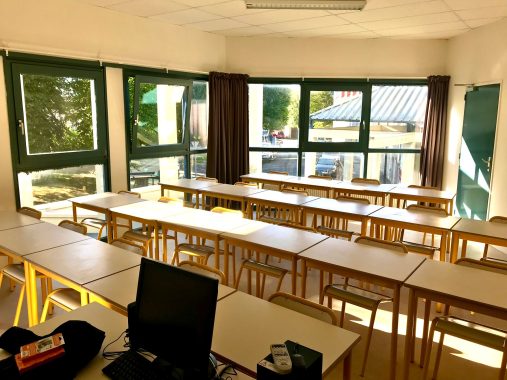
My classroom at the Lycée Sivard de Beaulieu where I taught English and Spanish. The sunlight in this room was always my favorite way to start the morning.
Today, in my role as Assistant Director at the Tufts University European Center, I feel that same spirit of exchange every day. Our impactful work in Talloires is rooted in values I hold dear: global citizenship, a commitment to pluralism, and the transformative power of education. Watching students grow in their cultural awareness, form deep connections with their host families, and see the world with new eyes reminds me why this work matters. In many ways, I see reflections of my own story in theirs. The joy and wonder that Madame Ansley sparked in me all those years ago now come full circle as I help students open their own windows to the world. It is wonderful to explore all these themes alongside our students, faculty, and staff who bring such depth, creativity, and heart to this shared mission.
From a small classroom in Georgia to the shores of Lac d’Annecy, my journey has been shaped by the simple joy of connecting across languages and cultures. The French language opened that door for me, and it continues to guide the way I live, learn, and serve today. At the Tufts European Center, we often feel the world become smaller and richer through connection. Stories like these remind us why our work in Talloires continues to matter to every student, faculty member, and staff member who believes in learning through experience.
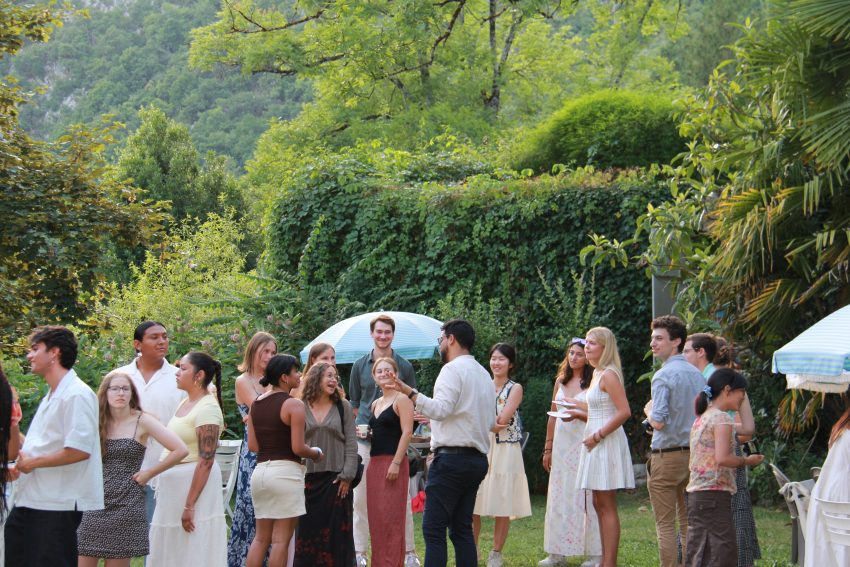
With the Tufts in Talloires 2025 cohort during their Final Fête Celebration. Photo by Meredith Doherty.
Author Bio: Nelson Millán Nales serves as Assistant Director of the Tufts University European Center. He oversees on-the-ground program operations and the student experience in Talloires, France, and is dedicated to advancing global citizenship and cross cultural learning. His work centers on building programs that foster curiosity, connection, and intellectual growth through immersive education.
Each summer, Nelson witnesses transformation as students arrive curious and leave changed by what they discover in themselves and in others. He views his role as both guide and participant in that process. The European Center has taught him that community, when nurtured with intention, becomes a living classroom where vulnerability, reflection and curiosity coexist. This insight continues to shape his work and his vision of what global education can be.